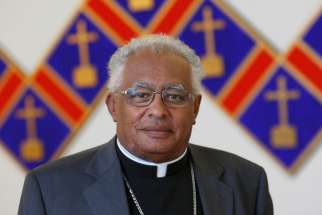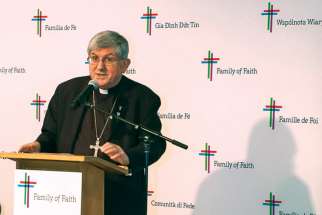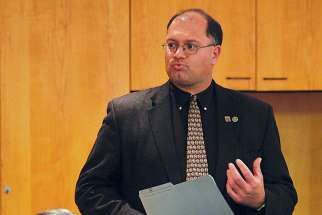Retired Sudanese bishop condemns ongoing bombing in Nuba Mountains
NAIROBI, Kenya - A bishop who served in Sudan until his retirement a year ago appealed to Sudanese President Omar al-Bashir to end a months-long bombing campaign that has killed and injured dozens of innocent civilians in the Nuba Mountains.
Donations a ‘tremendous witness’
The Archdiocese of Toronto’s $105-million fundraising campaign has surpassed $40 million in donations and pledges, due in large part to almost $700,000 contributed personally by clergy.
ShareLife looking for push in final weeks
TORONTO - With less than a month left in the 2014 ShareLife parish campaign, the charitable fundraising arm of the Archdiocese of Toronto is still more than a million dollars shy of its $12.65-million goal.
Development and Peace fall campaign is put on hold
The traditional fall education campaign of the Canadian Catholic Organization for Development and Peace is on hold until Oct. 15 while staff and volunteers scramble to come up with less political material that will gain the backing of all of Canada's bishops.
Canadian Conference of Catholic Bishops president Archbishop Richard Smith and general secretary Msgr. Pat Powers informed Development and Peace Sept. 5 that several bishops had objected to the fall campaign and did not want the material distributed in their diocese. It is the first time in the 45-year history of the Catholic development agency that the bishops have intervened to block an education campaign.
Neither the CCCB nor Development and Peace could tell The Catholic Register how many bishops have objected to campaign materials, which have been printed but not yet distributed. Through a spokesperson, Smith declined to be interviewed for this story as "the bishops have not had a chance to discuss the issue."
Bishops on the CCCB's Standing Committee on Development and Peace were not consulted on the move to halt the campaign and have not seen the materials.
"I haven't had it explained to me, so I can't really comment," said Toronto's Bishop John Boissonneau, chair of the committee. "I was aware that the president of the conference sent out a letter, but there's been no follow-up with me directly."
"I kind of feel out in the cold on this," said committee member Bishop Richard Grecco of Charlottetown.
The last time the bishops' committee met was May 31 for a consultation with the Development and Peace liaison committee for relations with the bishops. Meanwhile, work on the fall education campaign had been delayed until June while the organization dealt with major restructuring to accommodate a drastic cut in Canadian International Development Agency funding.
The fall campaign was to have veered off-course from Development and Peace's five-year plan of environmentally themed education campaigns. This campaign, which included postcards addressed to Prime Minister Stephen Harper, was conceived as a national consultation on the direction of Canada's foreign aid policy.
A copy of a Development and Peace postcard addressed to Harper was obtained by The Catholic Register. It asks Harper to "launch a national consultation on the future of Canadian development assistance." The card also urges a "Special Parliamentary Committee to examine the new direction of Canadian assistance."
"The trend in how Canada's foreign aid programs are administered has changed quite dramatically," Development and Peace executive director Michael Casey told The Catholic Register. "The role for civil society organizations like us is becoming less apparent. More of the money is going to multilateral institutions, private sector development.... We wanted to see if a constructive critique of this policy from our perspective could get a hearing."
The campaign did not mention the $35-million cut over five years in CIDA funding to Development and Peace, said Casey, and is not an attempt to revisit the funding decision, he said.
"Concerns were expressed regarding the nature and methodology of the campaign with respect that it could create some divisiveness within the Church community and that perhaps there should be some more consultations within D&P and also with the broader Church," said Ronald Breau, Development and Peace national council president.

Archbishop Smith
- Register file photo
Breau wrote to the Development and Peace membership Sept. 17 to explain the delay.
"We are fully aware that our decision will disappoint many of our active and engaged members," Breau wrote.
While the campaign will be modified, the fall action campaign will remain focussed on Canada's development aid policies. But the national council is heeding Smith's warning that the original campaign would "lead to division among our base, among bishops and among our supporters," Breau wrote.
"The bishops are concerned that ongoing dialogue between the Catholic Church and the Government of Canada on some important, timely and sensitive issues might be compromised by our approach at this time."
Parish Development and Peace leader Greg Kennedy is left wondering what his group will do while it waits for the campaign to launch.
"Traditionally Development and Peace at the parish level operates basically two times a year — one in the fall with the education campaign and then the Share Lent or ShareLife in (the Toronto archdiocese)," said the Jesuit, who is studying for the priesthood and helping out at Our Lady of Lourdes in downtown Toronto. "Without those bookends, really there's not much to do until Lent."
The appearance that the bishops are divided or opposed to Development and Peace has become a challenge for parish groups, said Kennedy. And the idea that the bishops' conference did not inform its own standing committee will be even more confusing.
"The bishops set up these avenues through which both they and Development and Peace would work and all of a sudden that gets over-ridden. That's disturbing," he said. "What's the point of having them if they're not going to be used."
But lobbying the government on policy does not amount to education, said Grecco.
"We can have that dialogue (on Canadian development policy). I just don't think it should be a campaign. That's not what D&P should be about."
ShareLife campaign comes in just shy of $15 million
TORONTO - The 2012 ShareLife campaign is over the top.
The annual campaign by the archdiocese of Toronto's fundraising arm surpassed its goal of $14.3 million by more than $600,000 this year. And for the first time since 1999, the campaign exceeded its parish goal, coming in at more than $37,000 over the $12.3 million goal.
Arthur Peters, ShareLife's executive director, said much thanks for pushing the campaign over the top must go to a matching gift donor, who wishes to remain anonymous. The donor matched new gifts as well as increased contributions from returning donors. All told, he gave $650,000 in matching funds.
"This year our parishioners were challenged by a generous donor to increase their gifts or to make new gifts to support the work of our agencies and they've responded very generously," said Peters.
Peters said the matching gift motivated parishioners to donate to the parish campaign, but did not directly contribute to the $12,337,548 raised — a seven-per-cent increase over last year. The $650,000 is reflected in a miscellaneous fund.
An additional $1.37 million came in from the corporate and school employee's campaigns pushing the collective total to $14,934,666.
"We're very grateful to the parishioners of the archdiocese of Toronto who in a difficult economy have responded generously to the needs of ShareLife's agencies and contributed a record amount to help those who are served by our agencies," said Peters.
Despite the present economic hardships, 157 parishes, about 70 per cent of those in the archdiocese of Toronto, increased donations from 2011. This marks the largest number of parishes to increase their gifts from the previous year seen by Peters since joining ShareLife eight years ago.
"At the end of the day our parishioners have always demonstrated a commitment to helping the marginalized in our society and around the world," he said. "These funds will be used to help the people who need our help the most."
Over the next few months ShareLife's allocation community and advisory board will determine the 2013 allocations, distributing this year's donations to more than 30 social service support agencies.
"The fact that we've raised a significant amount of money more in this years campaign means we'll be able to help our agencies in a greater way."






